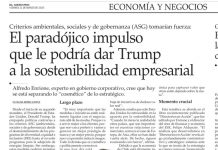Fuente: EY
Autor: Stephen Klemash
Through calm and steady guidance, board members can provide clarity and confidence in times of uncertainty.
In March 2020, the World Health Organization designated COVID-19 to be a pandemic, threatening the health and well-being of large numbers of people across multiple countries. The global outbreak has caused escalating levels of societal uncertainty, and by creating disruption of business continuity across all industries, it is predicted to destabilize financial markets and threaten global economic stability for an unknown duration.
With management focused on addressing the impacts of the COVID-19 crisis on the company’s operations, financial condition and stakeholders, it is imperative that the board enhance its efforts to provide strategic insight, oversight and foresight across short- and long-term horizons while continuing to exercise its fiduciary responsibilities.
We offer the following considerations for board members as they navigate this crisis:
- Clearly communicate a strong tone from the top; model desired attitudes and behaviors; and validate that crisis-related decisions, actions and communications are consistent with the company’s purpose, culture and values.
- Maintain appropriate protocols and information flow with management and external advisors and remain flexible with board operations and schedules so that the board can receive timely information that allows for open communication and effective deliberation and oversight.
- Support transparent and communications to stakeholders regarding company developments to guide decision-making, maintain trust and protect the company’s reputation.
- Obtain timely updates related to the company’s emerging risks and material threats, vulnerabilities and potential impacts (as identified by the company’s ERM program), and adjust risk appetite and tolerances accordingly.
- Determine whether the company’s financial scenario planning and stress testing are designed to adequately assess the levels of liquidity, credit and capital needed over relevant ranges; confirm that appropriate communications are occurring with financial intermediaries.
- As management continues to address employee and customer health, safety and morale, confirm that management is appropriately dealing with emerging legislative, administrative and regulatory developments, stimulus opportunities and developing practices.
- Verify that management is taking the appropriate actions to identify and manage material contractual commitments, insurance agreements, covenants and other obligations from both a legal and practical business perspective.
- Provide strategic guidance and support to management related to social and economic welfare initiatives that may involve short-term costs but deliver long-term value through improved social outcomes and enhanced corporate trust and reputation.
- Continuously challenge the scope, composition and decision-making authority of the company’s crisis management team to enhance its capabilities and effectiveness. Confirm that the team’s work is appropriately balanced between short-, medium- and long-term responses to the crisis.
- Continue to evaluate the company’s business continuity and contingency plans for the appropriate levels of redundancy, supply chain resiliency and effectiveness of third-party service providers to allow for the continuation, or quick recovery, of critical business functions.
- As companies shift to alternative and remote working arrangements, reassess key communication, operational and financial systems to confirm IT resiliency and appropriate levels of cybersecurity and data privacy, and that key controls are operating as intended.
- Confirm that management is continually monitoring the effectiveness of internal controls over financial reporting and disclosure controls and procedures (as well as events or factors that may result in material changes in financial statement reporting and disclosures) to enable the company to meet regulatory requirements for financial and other public disclosures and broader stakeholder demands for material information.
- As business models are adjusted to address the crisis in the short term, challenge how those changes uncover new opportunities along with operational effectiveness and efficiencies over the long term.
- Once the crisis is mitigated, conduct postmortems and assess lessons learned, including how the company’s business continuity plan is working and what actions the company needs to take to help build resiliency for future events.
The COVID-19 pandemic highlights the need for effective risk and crisis management programs to address extreme and unexpected events. Boards play a crucial oversight role with such challenges given their collective experiences with other crises and overall business judgment. Boards can significantly assist management not only with how they respond to the crisis but also how they recover from it with resiliency and strength.












